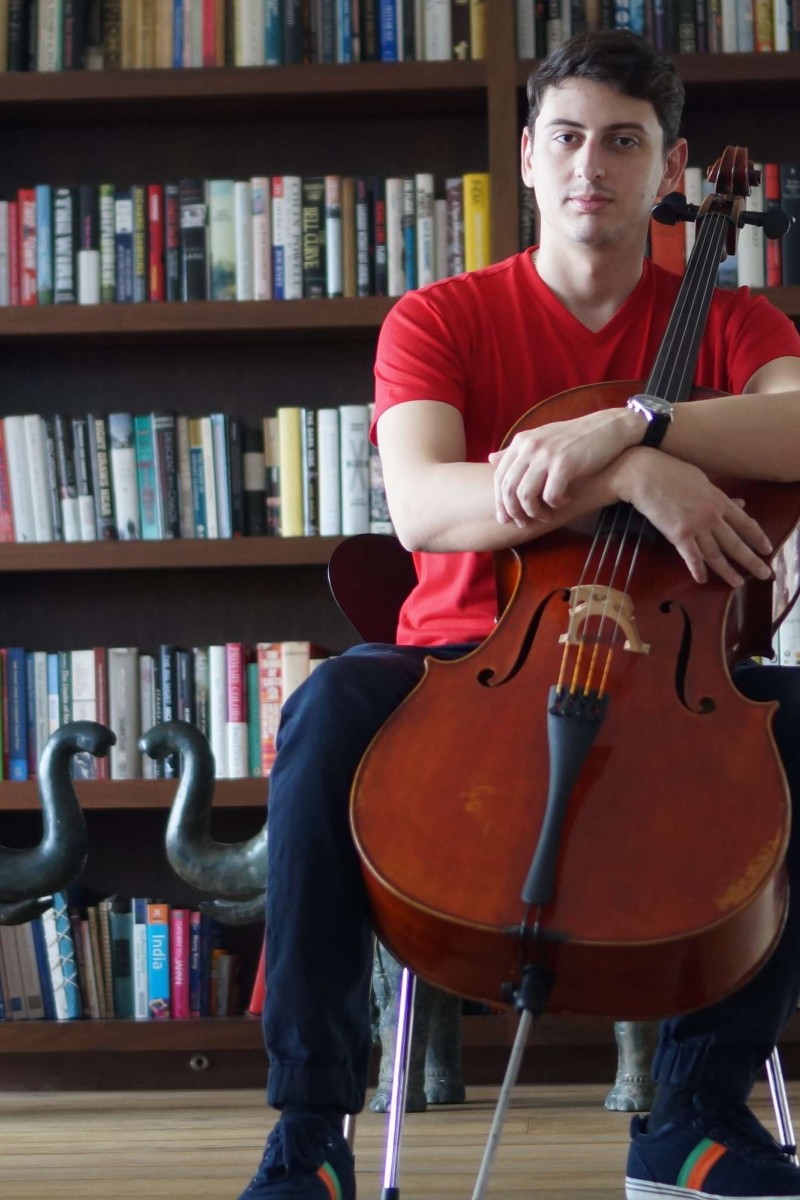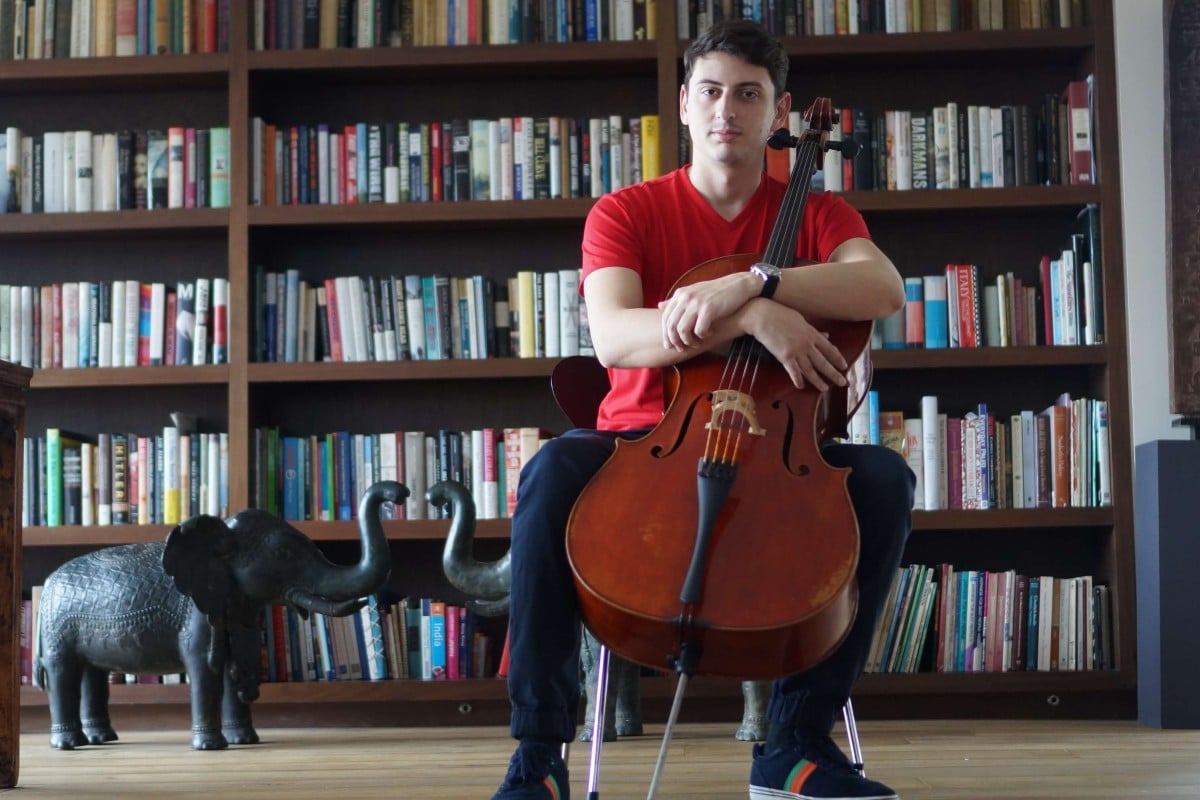
Armenian cellist Narek Hakhnazaryan on tips for practising and the classical music scene
Cellist Narek Hakhnazaryan tells Young Post that practice makes perfect – but only if you do it right
 Narek Hakhnazaryan was the First Prize and Gold Medal winner at the XIV International Tchaikovsky Competition.
Narek Hakhnazaryan was the First Prize and Gold Medal winner at the XIV International Tchaikovsky Competition. Armenian cellist Narek Hakhnazaryan is at the top of his game. At age 20, he earned a standing ovation in his debut performance at New York’s Carnegie Hall. He’s won the prestigious International Tchaikovsky Competition and was picked to stand in for Yo-Yo Ma.
Now 27, he’s touring the world with his trusted cello, and he stopped by Hong Kong last Tuesday for his first performance in the city. Young Post finds out how Hakhnazaryan went from being a wannabe football player to a classical purist.
How’s Hong Kong so far?
It’s my first time here. I did an interview at a radio station, and then we just drove around a bit, but I’m looking forward to feeling the vibe here.
How did you become a cellist?
My parents are musicians. My father’s a violinist and my mother a pianist, but my mother saw a cellist in me and signed me up for cello classes when I was six years old. In the beginning, I didn’t like it at all, because I wanted to become a football player. In the first few years you don’t get to play music pieces so much, and no normal kid would like practising the endless scales. Of course, once the scales practising phase passed, I also enjoyed playing concerts.
But in a way, my love for football made me a cellist. My dad made a deal with me, saying if I practised the cello enough during the day, then I could play football at night. It soon became clear that I had talent, and that cello was the best thing I can do.
When did you actually feel serious about being a cellist yourself?
I guess it all became serious when I moved to Moscow with my mother when I was eleven to study in the Moscow Conservatory. My mother sacrificed her career for that, and my father stayed at home in Armenia with my brothers to provide for us. Suddenly everything was at stake, and I realised that this is my life.
What tips do you have for help through that gruelling practise phase?
Make a game out of every practice. Make the routine more interesting by changing the speed, for example. Sometimes I set some goals for myself, like I would need to play a part flawlessly three times in a row, and if I failed the third time I would have to start all over again. It’s also helpful to imagine a jury of all great cellists listening to you play.
It’s not true when people say the more practice, the better; it’s all down to how well you practise. I’m quite busy and don’t have as much time as I would like to practise, so I’ve learned to be very concentrated when I do. I learned this from a great musician, Daniel Kramer, when I was playing in his jazz quintet. He told me when he practised for 30 minutes, it’s worth a month of my own practising, because he was so focused. To do this you have to know your body and psychology, and know your exact weakness and analyse what you need to work on. Focused practising is very demanding, though. After one hour I’m so tired I feel like I’ve been playing for seven hours.
You stood in for Yo-Yo Ma to play with the Chicago Symphony Orchestra in 2012. How did that come about?
He played two of the three concerts and I did the third one, I was notified three months ahead so it wasn’t a last minute thing. When we were there I approached him and introduced myself. We got talking and he was like, “You wanna try my cello? I’ll be in a meeting and it’ll just be in the dressing room.” I was shocked. I went and played for two hours by myself, and put it back in the case. It was just a amazing. It was a US$10 million cello and he just left it in the dressing room!
Have you noticed any changes in the styles of classical music performances?
There’s a lot more freedom in the interpretation of the music. Many manuscripts have been discovered, like those of Beethoven, Bach, and Brahms, and some musicians are really serious about the edition they are playing from. So it’s a lot more professional. Of course, there are a lot more musicians now, so there are more views on how a piece can be interpreted.
How would you describe your style of performance?
I try to be honest with the composer’s music. I don’t really show-off or do anything for the audience. The scores don’t need any changing because they are genius already. The musician is just the narrator, and the script is already written. It’s all about how you read it. It’s like Shakespeare: there’s millions of actors doing different things with his original works.
What do you think about musicians who crossover classical with contemporary music?
I don’t like crossover music. I think it ruins the original piece, and classical music is unmixable. It’s not right to change what the composer wrote. The musicians that do this say they are trying to bring a new audience to classical music, but it doesn’t work out that way, they are just bringing the audience to crossover music.
I play all kinds of music myself. Last year I did a pop song in commemoration of the 100th anniversary of the Armenian genocide, and I played in a jazz group for three years. I just don’t like mixing things up.
Which do you prefer, competitions or performances?
Performances, for sure. Music isn’t sports, which is all about scoring and winning. Music is for enjoying. It’s not pleasant to play and know that you’re being judged, but it’s something musicians have to do. After winning the International Tchaikovsky Competition I got lots of opportunities to sign with several managers.
If there’s one thing you would change about the classical music scene, what would it be?
I would hope for a younger audience. It’s always been older people listening to classical music, people older than 50, 60 years old. Pop and rock are just more accessible. They are played in clubs and restaurants. I also listen to rock music when I drive – it just feels weird to listen to classical when I step on the gas. You need a quiet atmosphere, you need to turn off your phone and shut off all your connection to the world. Listening to classical music is like a meditation. I’ve seen people with depression feel released after a concert.
I wish young people could appreciate that music doesn’t always have to be good for dancing. Classical music can take hold of your soul and make you cry in a way that pop music never can.